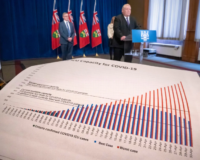As more Canadians find themselves living online while stuck at home during the COVID-19 pandemic, the Liberal government is accelerating its strategy to increase high-speed broadband coverage in rural Canada. A spokesperson for Rural Economic Development Minister Maryam Monsef said the government is consulting with telecommunication providers, rural municipalities and others about how best to move up plans to improve access to high-speed Internet in rural and remote communities. “The current crisis has reinforced the fact that high-speed Internet access is no longer a luxury,” said Marie-Pier Baril in a…
Read MoreCategory: Canada
COVID-19: What Is Digital Contact Tracing And Is Canada Using It? | CTV News
TORONTO — Canadian officials are turning their attention to digital contact tracing to prevent the spread of coronavirus, a strategy experts warn may come with significant privacy concerns. Officials in Newfoundland and Labrador are the latest in Canada to suggest the use of voluntary contact tracing apps that would use cellphone data to monitor people’s movements and warn them of any contact with COVID-19 positive patients, eliminating an arduous task usually performed manually by public health departments. Citing examples from Singapore and South Korea — two countries actively engaged in…
Read MoreOil Prices Dip Into Negative Territory As Market Crashes | Roadshow
The US oil market witnessed history as the price dived under $0 a barrel for the first time as the coronavirus pandemic bites. US oil prices crashed below $0 a barrel on Monday and spiraled into negative territory for the first time ever. In a historic crash, oil futures opened at their lowest level since 1983. With hundreds of millions of people around the world staying at home to stop the spread of COVID-19, travel by car or plane is nearly nonexistent. Factor in a major lag in manufacturing and…
Read MoreACLU Outlines Privacy Concerns For Contact Tracing Tech | Engadget
As Google and Apple prepare to team up on surveillance tech to help track the spread of Covid-19, privacy watchdogs at the American Civil Liberties Union (ACLU) are urging the government and tech companies to take a tougher stance on privacy. The ACLU published a lengthy white paper outlining privacy concerns they say need to be taken into account in order for contact tracing tech to be effective. Apple and Google’s proposal would use bluetooth data to detect phone owners’ potential exposure to people who have tested positive for Covid-19.…
Read MoreApple And Google Are Building Coronavirus Tracking Tech Into iOS And Android | CNET
The two companies are working together, representing most of the phones used around the world. Two of the tech industry’s biggest players are working together to fight the coronavirus, announcing a new set of tools that could come to a majority of smartphones around the world. The new technology, outlined in white papers published by Apple and Google Friday, relies on Bluetooth wireless radio technology to help phones communicate with one another, ultimately warning people about people they’d come in contact with who are infected with the coronavirus. Apple and Google plan to…
Read MoreFacebook Begins Sharing More Location Data With COVID-19 Researchers And Asks Users To Self-Report Symptoms | The Verge
The company’s Data for Good program is expanding. Facebook is expanding a program that grants researchers access to data about movement patterns in an effort to help improve our understanding of the spread of COVID-19, the company said today. Data for Good, which uses aggregated, anonymized data from Facebook’s apps to inform academic research, will now grant access to three new maps for forecasting the disease’s spread and revealing whether residents of a given region are staying at home. The company will also prompt Facebook users to participate in a…
Read MoreIs Canada Bad At Sharing Public Data? COVID-19 Rekindles An Old Debate | CBC News
A debate that normally resides in the realm of wonkery roared to public attention this week, with Ottawa’s reluctance to release projections of the pandemic death toll. Is Canada bad at sharing public data? It’s a recurring obsession of journalists and researchers who use government data about things like health care, economics, crime and housing. By now, Americans haven’t just seen fatality projections. They have a one-stop site with estimates for all 50 states of how many deaths there might be, how many hospital beds and ventilators might be required,…
Read MoreEmail, Text Message Attacks Surge During COVID-19 Crisis | CBC News
Cybersecurity experts describe it as a perfect storm: employees working from home — away from their firm’s IT experts and sometimes without the protection of a corporate computer network — and hungry for information about a mysterious coronavirus. With the COVID-19 crisis as the backdrop, fraudsters appear to be redoubling their efforts to steal information or money from unsuspecting users, sending fake emails and text messages as bait, in a scheme known as phishing. In one scam, fraudsters pretend to be processing EI claims, preying on Canadians who’ve recently lost their jobs.…
Read More‘Internet Is The Only Lifeline They Have’: Canada Needs To Confront ‘Digital Divide’ Amid COVID-19 Crisis | CBC Radio
The COVID-19 pandemic is forcing Canada to confront many of its hidden social inequalities, one of these being unequal access to the internet, an internet freedom advocate says. Laura Tribe, executive director of OpenMedia, says disproportionate access to the internet is often talked about in terms of only affecting the North or remote communities, however, the current public health crisis has shown the problem is just as common in many cities. “There are so many people throughout the country — even in urban areas — that don’t have the internet…
Read MoreBell, Rogers, Other Telecoms Remove Internet Data Caps Amid COVID-19 | CTV News
TORONTO — As Canadians grapple with a growing list of cancellations, closures and travel restrictions, several Canadian telecom companies are temporarily removing overage fees on home internet plans amid the ongoing COVID-19 outbreak. In a statement issued Saturday, Bell Canada, which owns CTV News, announced it will waive any additional usage fees for residential internet customers, including Bell Aliant, Bell MTS and Virgin Home Internet services, until the end of April. “Any overage fees will be waived automatically, so customers don’t need to make any changes to their accounts,” the…
Read More








